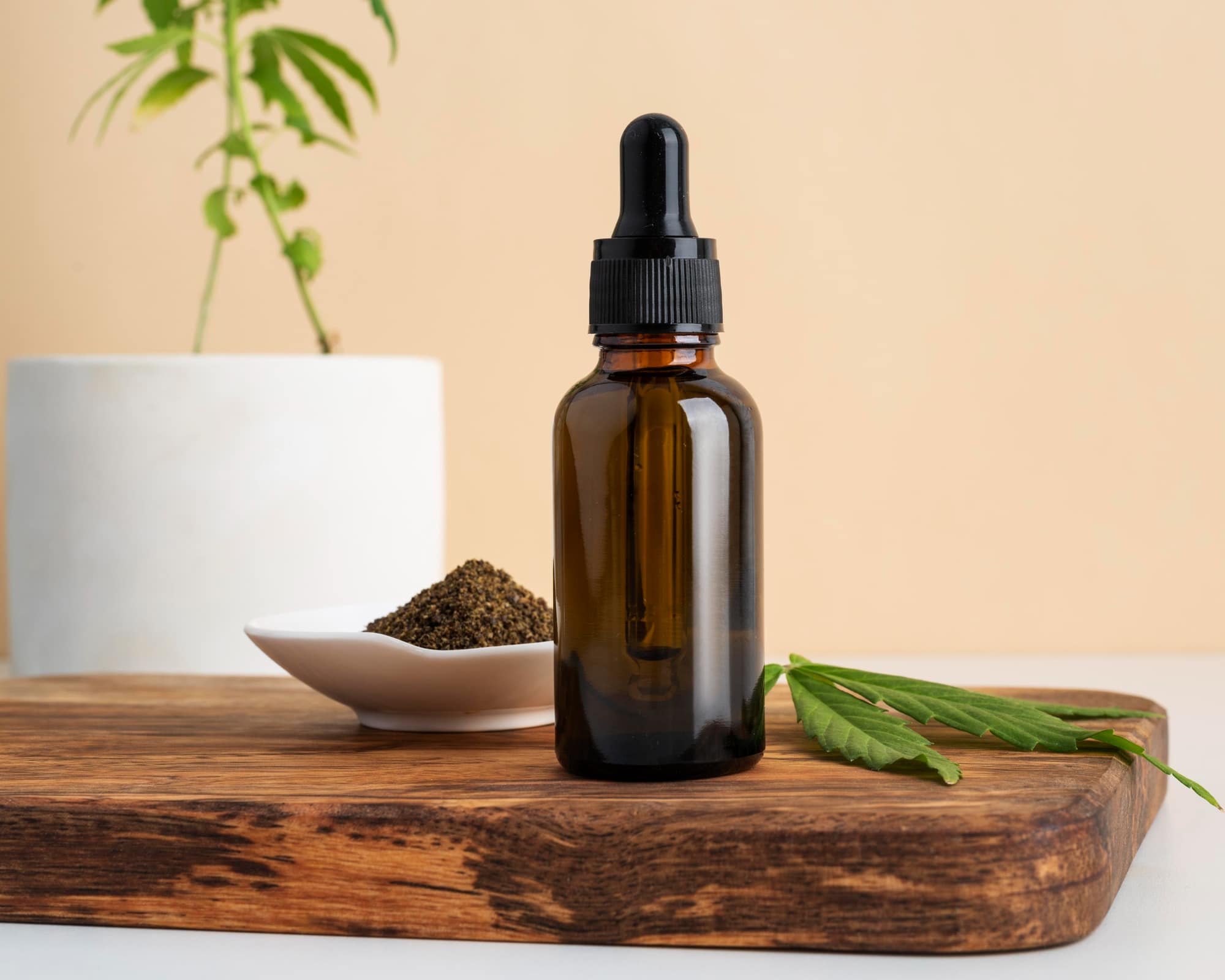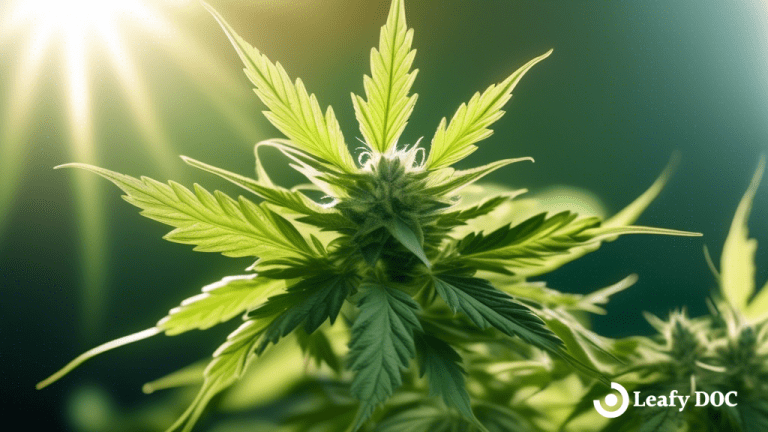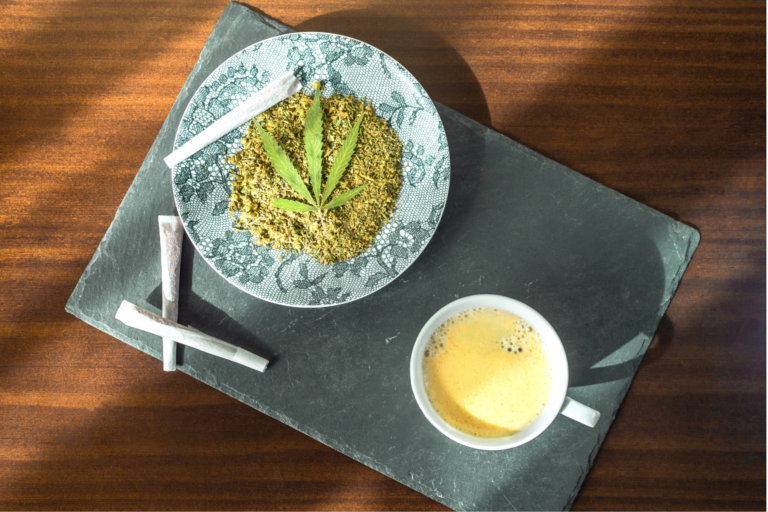Can you Overdose on CBD?
by Haley Mills · March 5, 2023
CBD is a popular natural remedy used for many common ailments. But can you overdose on CBD? Find out the risks and side effects of taking too much CBD.

Cannabidiol CBD is legal in the United States and can be easily accessed online and in stores in most cities nationwide. Decades of research have proven it can benefit chronic pain, sleep disorders, anxiety, migraines, and many other ailments.
There are many questions about the health benefits of CBD and ongoing misconceptions regarding the use of CBD. Today, we explore the question: Can you Overdose on CBD? Read on to find out.
What is CBD?
The Farm Bill of 2018 made cannabidiol CBD legal as a controlled substance in the United States. Prescription-strength CBD oil derived from the cannabis plant has been approved by the FDA as a practical option for seizures and is often used to help patients with epilepsy.
Cannabidiol CBD is a cannabinoid found in the cannabis plant used to manage various health conditions such as inflammatory and neuropathic pain. CBD is found in marijuana and the hemp plant. Hemp-derived CBD products are legal and do not contain THC, the cannabinoid in marijuana that causes psychoactive effects.
How long do the effects last?
CBD can stay in a person’s system for up to a month, depending on dosage and how it is administered. Typically, CBD sprays can remain in the body for ten to two days, regular oral consumption can mean CBD remains in the system for ten to twenty-five days, and CBD can stay in the system for up to a week after smoking.
Generally, you can begin to feel the effects of CBD within fifteen minutes of vaping or using it sublingually. Edibles and topical products can kick in as long as an hour or two, and the effects can last for four to eight hours, depending on dose, metabolism, and consumption method.
What is a cannabinoid?
Cannabinoids are found in the cannabis plant and are produced naturally by the human body. We have an endocannabinoid system (ECS) that internally produces cannabinoids. These compounds are essential to maintaining internal balance through many different body systems.
Cannabinoids interact with our ECS to help maintain functional balance through a system of messenger molecules and receptors. Sleep, energy, cardiovascular function, reproduction, stress, chronic pain, motivation, appetite, digestion, and more are some bodily functions that cannabinoids impact.
Can CBD interact with other medications?
Yes. CBD can also cause adverse events from drug interactions with prescription medications (blood thinners or blood pressure drugs) or dietary supplements. Be sure to seek professional medical advice if you’re on current medications and considering using full spectrum CBD oil or any other CBD product.
Can a pet overdose on CBD?
From a medical standpoint, pets can not overdose on CBD. However, it’s important to remember that there are exceptions to every situation, and adverse reactions can occur. But, how much CBD is too much CBD will be a case by case basis.
Your pet should continually be monitored when being given a substance. While CBD does not interact with the brainstem or respiration systems, THC can be toxic, so read labels on pet CBD products.
Relevant animal studies on CBD has been shown to have various health benefits for pets, such as chronic pain relief, anxiety disorder relief, and even help with muscle spasticity, seizures, and insomnia.
There are a few mild side effects that can come along with pet CBD oil. Usually, a higher CBD dosage will render more side effects than lower doses of CBD oils for dogs.
- Using CBD oil can decrease saliva production. In dogs, this can present as increased thirst and drinking more water. It’s best to ensure they have an entire bowl of water when administering CBD oil to dogs.
- The calming, relaxing effects of CBD can cause drowsiness. You may notice your dog taking more or longer naps, especially with higher doses of CBD.
- Higher doses of CBD can cause a temporary, minuscule drop in blood pressure. This may show up as light-headedness and dizziness for your pet.
The right dose of CBD oil for dogs depends on many factors. The product and level of CBD contained, and the tolerance and experience of the individual are all critical. A pet’s weight and body chemistry also influence CBD oil dosage.
Can I overdose on CBD?
Though it’s typically well-tolerated by the human body, CBD can cause adverse effects like dry mouth, diarrhea, reduced appetite, and drowsiness.
CBD from Hemp
Hemp oil has a higher CBD content than marijuana-derived CBD, and many products contain hemp-derived CBD. Hemp seed oil comes from the Cannabis Sativa family and has long been used to make clothing, paper, and cloth for medical purposes.
CBD from Marijuana
CBD is found in all strains of cannabis, both Indica, and Sativa. Marijuana contains a much higher THC content than hemp and other chemicals that can aid and bolster the therapeutic benefits of CBD. A cannabis Sativa plant will also have higher levels of pure CBD than hemp plants.
Can I overdose on THC?
A person can not overdose on cannabis as they can overdose on alcohol, heroin, or prescription medications and pills. To date, there have been zero reported deaths resulting from cannabis use, according to the Centers for Disease Control and Prevention (CDC). However, you can overdo it and experience adverse reactions to consuming too much THC, but the side effects are not typically to the level of toxic dose but rather just uncomfortable.
What is cannabis dependence?
CBD is not addictive per current drug safety requirements; marijuana can promote dependence among some users. Marijuana use issues are frequently linked to dependency, which occurs when a person has withdrawal symptoms after they stop using the drug.
Irritability, mood and sleep problems, decreased appetite, cravings, restlessness, and physical discomfort are common among marijuana users. These symptoms peak within the first week after quitting and last up to two weeks.
The Benefits of Using CBD
A recent study was performed on smokers to see if cannabidiol reduces cigarette consumption. It showed that CBD reduced the number of cigarettes smoked by 40 percent compared to placebo-treated patients.
Clinical data from a recent study by the Recovery Research Institute concluded that:
“This study showed that CBD, compared to placebo, helped decrease the cue-induced craving and anxiety of individuals with heroin use disorder. Many people with opioid use disorders seek alternative treatments to curb cravings and reduce stress and are reluctant to try agonist treatments such as methadone or suboxone.”
CBD could also have some neuroprotective properties and has been shown to slow some degeneration of neurons. CBD works as a natural pain suppressant and increases the activity of serotonin receptors in the brain. This increased activity positively affects pain and reduces anxiety disorders, stress, depression, sleep disorders, and obesity, among other things.
CBD has anti-inflammatory qualities, can reduce pain, and even fully treat pain in some patients. It is also an antioxidant and can help reduce long-term inflammation. CBD contains cannabinoid receptors that can block chronic pain signals in the brain and trigger an increased immune response.
Research has shown CBD to affect different forms of anxiety disorders positively. It has been shown to reduce stress. CBD benefits general anxiety disorder and other severe anxiety conditions, including post-traumatic stress disorder, obsessive-compulsive disorder, and social anxiety disorder. Studies in mice and rats showed lower heart rates and less stress with CBD.
A recent study that used a simulated public speaking test to show anxiety levels in speakers showed significant promise that CBD can help reduce fears and anxiety associated with speaking in front of a group. Continued research is being done to see how CBD can manage various forms of stress.
Recent research suggests CBD could help people at risk of Alzheimer’s disease. A 2021 study showed that CBD could regulate levels of the IL-33 protein, which alerts the brain of potential risks. The study also showed CBD helps remove plaque from the brain, a significant risk factor for Alzheimer’s disease and dementia.
The World Health Organization (WHO) has officially stated that CBD oil can have medical benefits for those who suffer from health conditions such as:
- Multiple sclerosis
- Alzheimer’s disease
- Parkinson’s disease
- Huntington’s disease
- Schizophrenia and other psychiatric disorders
- Inflammatory Bowel Disease
- Crohn’s disease
- Arthritis
- Chronic pain & Neuropathic Pain
- Nervous system disorders
- Low & High Blood Pressure
- Severe forms of Insomnia
- Epilepsy
- Seizures, Dravet syndrome, Lennox Gastaut Syndrome
- Drug and Alcohol Dependence
- Cancer treatment
- Dementia & Alzheimer’s Disease
- Post-traumatic Stress Disorder
CBD Consumption
CBD can be taken and used in multiple ways. There are four main ways CBD-derived products are generally utilized. We recommend practicing safety and side effects being well known before use.
You can use topical CBD-infused products directly on this skin. While this includes patches, salves, creams, lotions, and more many people will apply the oil directly to their skin.
Ingestion of oral CBD can be done through drops, tinctures, capsules, beverages, or added to foods. CBD Gummies, chocolate, coffee, and even savory snacks are choices for CBD edibles.
Sublingually taking CBD means placing a few drops of medical cannabis tincture or oil under the tongue and allowing it to be rapidly absorbed through mucous membranes located in the mouth. Sublingual CBD can have faster effects and is a discreet way to take CBD, which appeals to many users.
Learn More about the Right Dose for You
CBD can have various health benefits for humans and pets, although the correct dose can vary from individual to individual. Cannabidiol CBD isolate can be used in many different forms and settings, and we recommend starting with a small dose and working your way up as needed.
Remember to learn your state’s medical marijuana laws, purchase products from reputable dispensaries, and consult a healthcare professional or knowledgeable budtender if you have questions or concerns.
Leafy DOC can help you get a medical card, connect you with a health coach and lead you to medical dispensaries with the top CBD products.
Last Updated: August 8, 2024
Get Approved for Your Medical Marijuana Card in Minutes!

Get Your Medical Card
Connect with a licensed physician online in minutes

Like This Article?
Share with your friends
Table of Contents
Keep Reading
-
4 Steps to Cook with Pot for Pain Relief and Enjoyment
Learn how to cook with pot for pain relief and enhance your culinary experience.
-
The Potential Of Cannabis In Immunotherapy For Cancer
Unlock the power of cannabis in cancer immunotherapy. Learn how this natural remedy is poised to transform treatment methods. Click now to explore the potential of cannabis and revolutionize your understanding of cancer therapy.
-
Decarbing Your Cannabis 101
Unlock the full potential of your cannabis! Learn the basics of decarbing, what it means, and how to do it right with our Decarbing Your Cannabis 101 guide.



